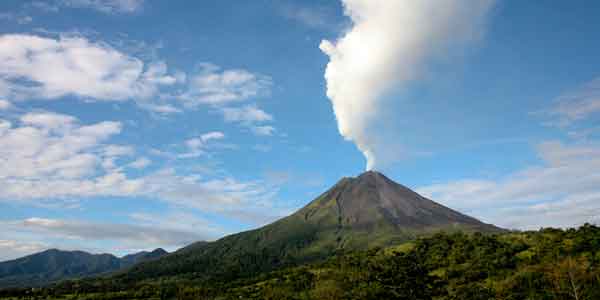

In the last two decades, Costa Rica has transformed from one of the world’s most rapidly deforested countries to one of the foremost pioneers in environmental protection, thanks to groundbreaking policies.
Natural resource accounting was undertaken as early as 1991 in Costa Rica. A study by the World Resource Institute (WRI), together with local counterparts, compiled accounts for forestry, soil, and fisheries. In 1997, Costa Rica became the first country to initiate a country-wide payments for environmental services (PES) program.
While comprehensive environmental policies have reversed the trend of environmental degradation and now more than 52% of the country area is covered with forests, the WAVES Partnership will provide policymakers with the tools to continue along their sustainable development path.
Wealth accounting and valuation of ecosystem services will help address some important questions. For example, Costa Rica has invested a great deal in protecting its forests, especially given the tourism and watershed services they provide. However, knowledge about the return of those investments and its global impact on the economy is limited. For instance, how much tourism revenue is actually generated by forests and protected areas, and to what extent do local communities benefit from forest protection?
Making WAVES in Costa Rica
WAVES will support the construction of asset accounts for water and forest resources; promote the valuation of natural capital, ecosystem services, and the integrated economic-environmental accounting to generate accurate information on the current use of natural resources for national policy planning; and expand available information and indicators to monitor the progress of specific policy actions. Through these actions, WAVES will contribute to establishing better analytical and decision-making tools for sustainable development planning in Costa Rica.
Outcomes will include a water account to organize the existing hydrological and economic information of the country in a coherent and consistent framework and a forests account to incorporate physical and monetary values of services provided by forests to inform policy decisions on forest management (including the REDD+ Strategy and forest landscape restoration initiatives).
The Costa Rican congress is considering a natural capital law that calls for all environmental impact assessments of public and private investments to incorporate natural capital accounting into its feasibility studies. The WAVES team has had technical discussions with Costa Rican Congress representatives on developing this law.
The Story So Far
The national steering committee (NSC) met in December 2013 and agreed on its operational guidelines and a short-term work plan for January to June 2014. Two technical committees are working in coordination with the NSC to develop the WAVES initiative in Costa Rica: a water technical committee and a forests technical committee. These committees will be responsible for database development and information management, statistics validation, and interagency technical work.
Starting in January 2014, the Central Bank of Costa Rica environmental accounts team has participated in meetings and hosted mini-workshops to present and discuss the SEEA 2012 framework and WAVES work with various governmental departments and institutes responsible for the production of primary official data and information related to water and forest resources.
The preparation phase has been completed and the NSC was established. The NSC and stakeholders discussed a feasibility study and a policy note in two technical workshops. A short-term work plan (January 2014–June 2014) was approved by the NSC and WAVES Secretariat in December 2013 and is being implemented. Work to develop water and forest accounts started in January 2014.
Progress on Accounts
- Water accounts: Work on water accounts began in late 2013. An inter-agency working group for the Water Technical Committee (WTC) was established in April 2013 to compile a comprehensive set of accounts covering water resources, balances, water use and pollution, including the economic cost of pollution. Preliminary water accounts components have been compiled based on existing data and Central Bank estimates. Sources used include water statistics from national accounts, hydrological balances, water use and pollution databases, and water utilities’ financial statements.
- Forest accounts: Forest accounts will include both timber and non-timber products, as well as the economic value of ecosystem services and a carbon balance. Data is being collected from leading organizations, the National Forestry Financing Fund (FONAFIFO) and the National System of Conservation Areas (SINAC), including Payment for Environmental Services (PES) contracts, economic valuation of alternative land uses and biophysical data from the 2013 national forests map and inventory. Technical meetings and in-house workshops with leading agencies have contributed to capacity building and coordination for data collection and systematization.
WAVES contributed to establishing the National Environmental Indicators System (SINIA) in May 2013. It will develop the environmental information to be integrated into the National Accounts to be constructed by the Central Bank, and will be particularly relevant to build the physical accounts for water and forests.
WAVES collaborated on the chapter of Costa Rica in the second edition of the GLOBE Natural Capital Legislation Study, published in June 2014, and made a presentation at the GLOBE 2nd World Summit of Legislators in Mexico.
